by Brian Hioe
語言:
English /// 中文
Photo credit: 許菡芸/Facebook
Translator: Brian Hioe
On September 18th, New Bloom editor Brian Hioe interviewed Hsu Han-yun of the Social Democratic Party, who is running in the Zhongzheng-Wanhua area of Taipei. This is part of New Bloom’s ongoing series of interviews with independent city councilor candidates, as part of its special 2018 election coverage.
Brian Hioe: Could you briefly introduce yourself for readers who may not know you?
Hsu Han-yun: I’m Hsu Han-yun. I’m twenty-six this year and I am representing the Social Democratic Party as a candidate in Zhongzheng-Wanhua. At twenty-six, I am Taipei’s youngest electoral candidate. First, I hope that my age and my background with three years of working in local neighborhoods will bring something new to Taipei. In Taipei, the average age of city councilors is 52. The average age is twice my age, so I hope very much to allow the voices of young people to be represented by the city councilor.
 Photo credit: 許菡芸/Facebook
Photo credit: 許菡芸/Facebook
Secondly, as a candidate of the Social Democratic Party in Zhongzheng-Wanhua, this is a relatively older district. As such, I hope that with urban renewal, the area’s history can be preserved in diverse ways in order for this area to be seen by everyone and to be remembered.
BH: Can you explain how you began to participate in social movements, such as with the Sunflower Movement?
HH: I began to participate in social movements during my time in college. In college, the first social movement I participated in what the anti-Kuokuang naphtha cracker movement. At the time, Representative Luo and local residents came to Taipei to protest outside the Department of Environmental Protection.
In high school, because I was continuously seeing movements such as the Wild Strawberry Movement and the Losheng Sanatorium preservation movement, this led me to feel that college would provide opportunities to see what street protests in Taiwan were like. In any case, the anti-Kuokuang movement was my first social movement, and later on, I also participated in the Losheng Sanatorium movement, protests regarding Shaoxing community, and a lot of different large and small protests, including also the LGBTQ movement.
What I participated in more deeply during my college days was the student government at NTU. These experiences accumulated up until the Sunflower Movement during my senior year of college. Because of my past experience and the people I knew, that year, I and others helped establish the rest center set up at the old NTU Social Sciences Department at the old NTU Xuzhou campus Social Sciences Department, to create a rest center and space for discussion outside of the main site of the Legislative Yuan. Afterward, there ended up being a lot of controversies, but we hoped to maintain a space focused on students and social movement participants, to preserve the spirit of discussion.
Apart from that, I also participated in D-Street—a street democracy discussion which took a deliberative democracy approach in leading everyone to reflect on the effects from the Cross-Strait Services Trade Agreement and how we should decide on Taiwan’s future, as well as discuss what to do if the standards of the agreement were to be decided by Taiwan’s legislators, because an important demand was to break apart the black box governance and not for the Legislative Yuan to pass agreements in less than thirty seconds of deliberation. So if it was up to the people to decide on the agreement or cross-strait agreements as a whole, this would be good. Usually, it would be ten to twenty people per group and groups would divide up to discuss how to combat China’s influence in national security, the economy, and politics.
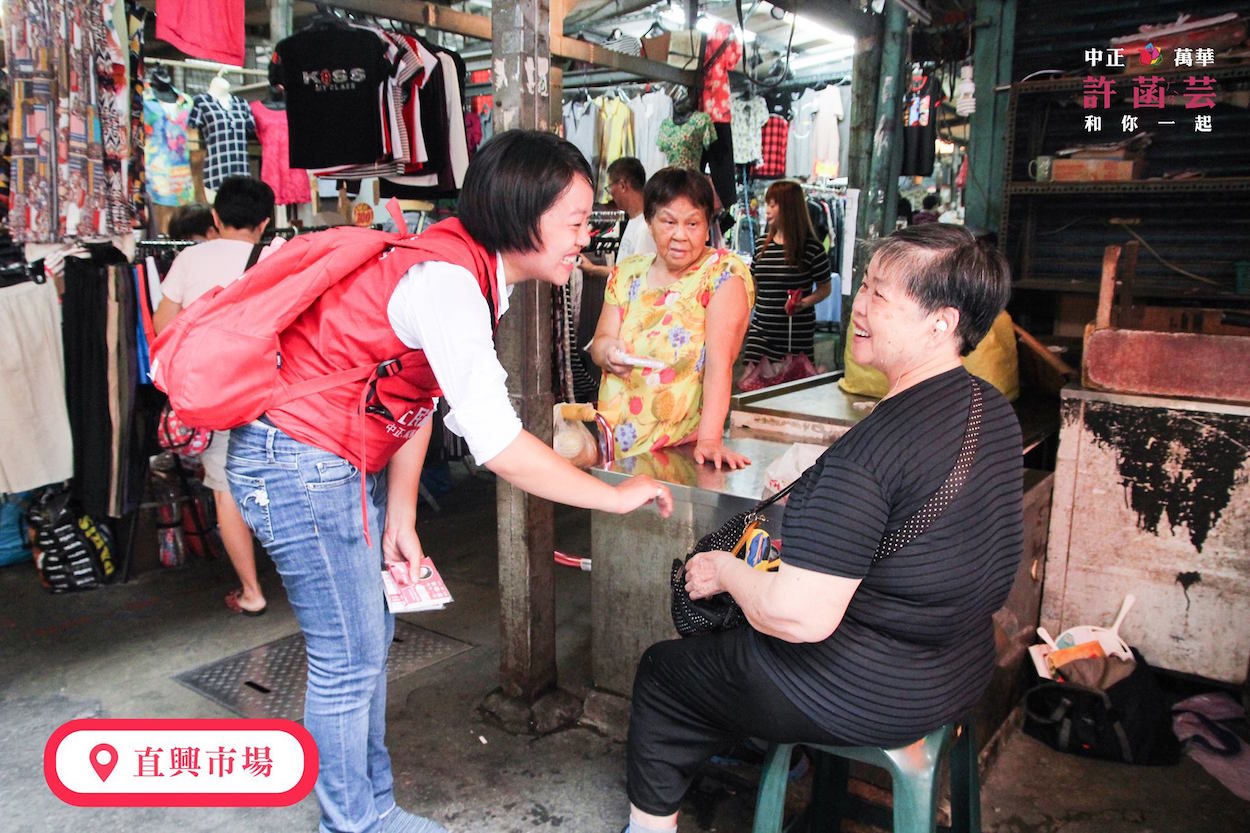 Photo credit: 許菡芸/Facebook
Photo credit: 許菡芸/Facebook
BH: Later on, how did you join the Social Democratic Party?
HH: In my fifth year of college, I decided to study abroad in America for a year. After a year in Madison in Washington, I interned at the National Endowment for Democracy in DC for two years. After my experiences in DC, given my background in politics and sociology, I hoped to experience directly participating in the political process.
The year I came back was 2015, which was the year before elections. I had the opportunity to directly observe the process of a campaign team participating in elections, as a way to better understand Taiwanese democracy. It was a way to be more in touch with the people. I knew that several small parties were looking for assistants, as well as the DPP. Many friends were working in political parties. At the time, I came into contact with both the SDP and the DPP. Afterwards, part of why I joined the SDP was because of districts. Fan Yun was competing in the district that my mother and father lived in—Daan. Apart from that, I believed that, among the third force parties, the SDP seemed to be willing to discuss policy, as a political party willing to clarify aspects of policymaking processes that had been overlooked by other parties in the past.
In hoping to participate in the political process, I joined the SDP. Subsequently, the process of elections turned out to be very different than what I had thought since a large part was focused on developing a local organization that would build connections with local residents. This is one reason why I joined the SDP, so I could get to know politics on the grassroots level, and learn how to share my ideals with others.
BH: What do you think Social Democracy represents in Taiwan? Because Taiwan didn’t have a Social Democratic Party before?
HH: Actually, in the past, in the 1980s Ju Gao-jeng formed the Chinese Social Democratic Party. At the time, he may have hoped to create a new path within the KMT, perhaps one more focused on social welfare or social democracy. I think that the SDP’s formation represents that in this era, Taiwanese people care very much about issues of low wages, youth poverty, and labor. For example, some young people have starting salaries as low as 22K. With such low salaries, there is no way to start a family or even to establish one’s own life. I think that the formation of the Social Democratic Party reflects this concern.
Much as in the 1980s, Taiwan’s concern was with the development of progress and democracy, hence the need for the Democratic Progressive Party. But now we confront the need for democracy within society—not just within the political system, but within society—and we need an inclusive path for society to embrace different voices. This is why we would take on the name of social democracy, to establish inclusive and diverse values, to resolve the problem of youth poverty.
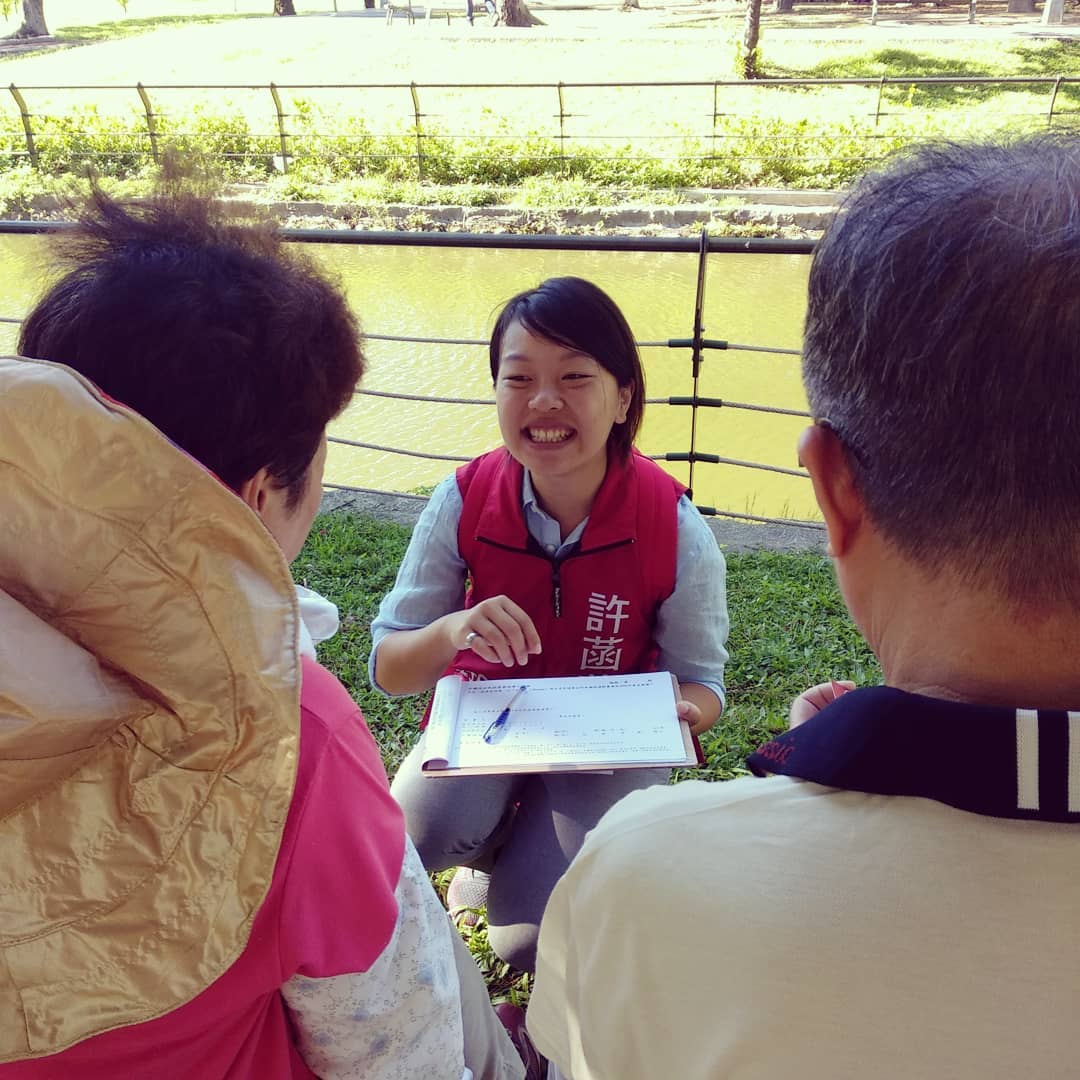 Photo credit: 許菡芸/Facebook
Photo credit: 許菡芸/Facebook
BH: What is particular about your electoral district? What is your strategy in this campaign to address the particularities of your electoral district?
HH: My district of Zhongzheng-Wanhua developed quite early within Taipei. At the time, Guiyang Street was referred to as Taipei First St. , and it was the street where foreign goods were delivered from boats, and so businesses started developing in this area. . In terms of commercial development in Taipei, Wanhua’s actually took place earlier than Dadaocheng.
There are many old buildings and temples in this district, whether in Wanhua or southern Shongzheng. But this district is facing an issue, which is that while the district was wealthy in the past, the district is now becoming older and older, and the district’s central axis is shifting eastwards.
As a result, many political candidates hope to develop tourism to preserve historical and cultural structures and to carry out urban renewal. That is, they hope to turn the district around to allow for a rebirth of the area. The other aspect of it is that because rent is cheaper in Zhongzheng-Wanhua, people are willing to return to their homes to start a business and start families. We’ve found that Zhongzheng-Wanhua has the third largest amount of young people in Taipei, after Neihu and Nangang—usually people in their twenties or thirties, in the same age group as me.
I believe that with this combination of young and old, there is a strong need for childcare services and elderly care services. These are two issues that the Social Democratic Party is highly concerned with. The eight legislators in this area are divided in half between the pan-Blue camp and the pan-Green camp, and these legislators have all been in power a long time—usually from eight years to twenty years. I hope that my running at age 26 can challenge the pattern of city councilors all being on the older side, and address the problem of rigidity within the legislature in the past.
BH: What do you think is special about yourself, compared to other political candidates?
HH: I think there are two key points. The first, I just spoke about, which is that I am an ordinary person who is twenty-six, who is not a second-generation politician or from a wealthy family. I hope that the people in this area can see that a young person with this background is willing to take on political responsibilities.
This also returns to what I said before—that these young people whose ages are not so different from mine are willing to return home and start businesses. Their parents or uncles and aunts may be vegetable sellers or butchers. They may choose the same traditional industry, but they may decide to do things differently, such as use business strategies they’ve learned from studying overseas, such as O2O or B2B, and to bring this into traditional industries.
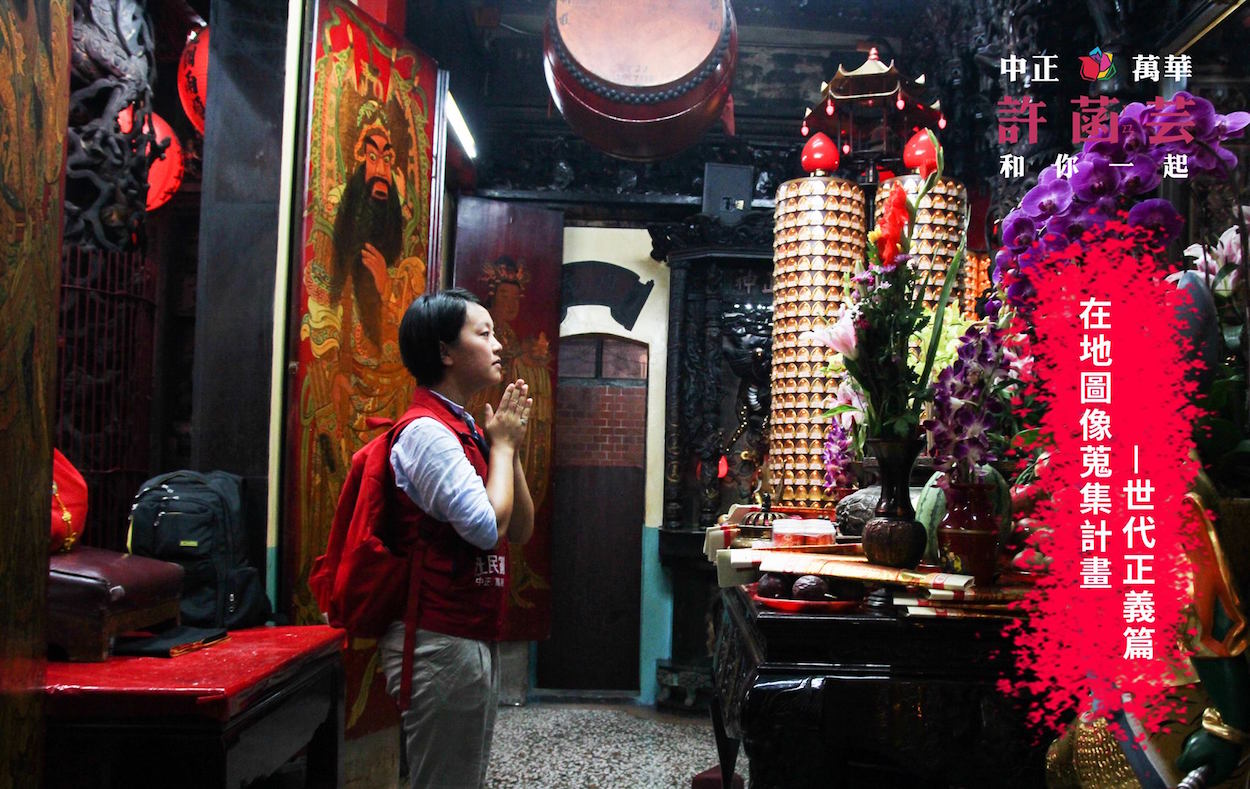 Photo credit: 許菡芸/Facebook
Photo credit: 許菡芸/Facebook
I hope similarly to bring my experience in the NTU student council, as well as in street protests, to realize an open and transparent, as well as a responsible and accountable way of running our district. This is one point.
Second, what is more different about us is that we are running a campaign with low expenditures. It was quite lively when the KMT put out their candidates, which consisted of many new candidates. They spent a great deal of resources on campaign ads and flyers and other assorted expenses, and this is obvious to the extent that people are joking the party may have spent at least 5,000,000 to 10,000,000 NT on these. Of course, such campaign ad expenses are hardly rare in Taipei, as well as in other cities and counties.
But you might think that with Taipei being an electoral region containing so much media, resources, and power, why would a new candidate need to spend so much money? Seeing that these people spend so much, then wouldn’t that suggest that after taking office, these candidates would be easily swayed by sources of money, such as companies who funded their campaign in the past and etc. If we want to pursue open and transparent politics, we should continue to depend on our own donations, and not accept funds from companies. I hope Taipei city residents can observe this process and see its importance.
BH: At the same time, what are the challenges you think you need to overcome?
HH: I actually feel that our electoral district is a small electoral district, out of Taipei’s six electoral districts. But regardless of the district we are talking about, the same challenge exists, which is that of recognizability. In the past, we have often had the belief that if our political views were good enough, then voters would for idealistic young people like ourselves. But it’s not like this, we always have to be working on our recognizability.
For me, in this district, the challenge is how to get 350,000 voters to recognize us in a short period of time, maybe eight months, and to get to know a political candidate.
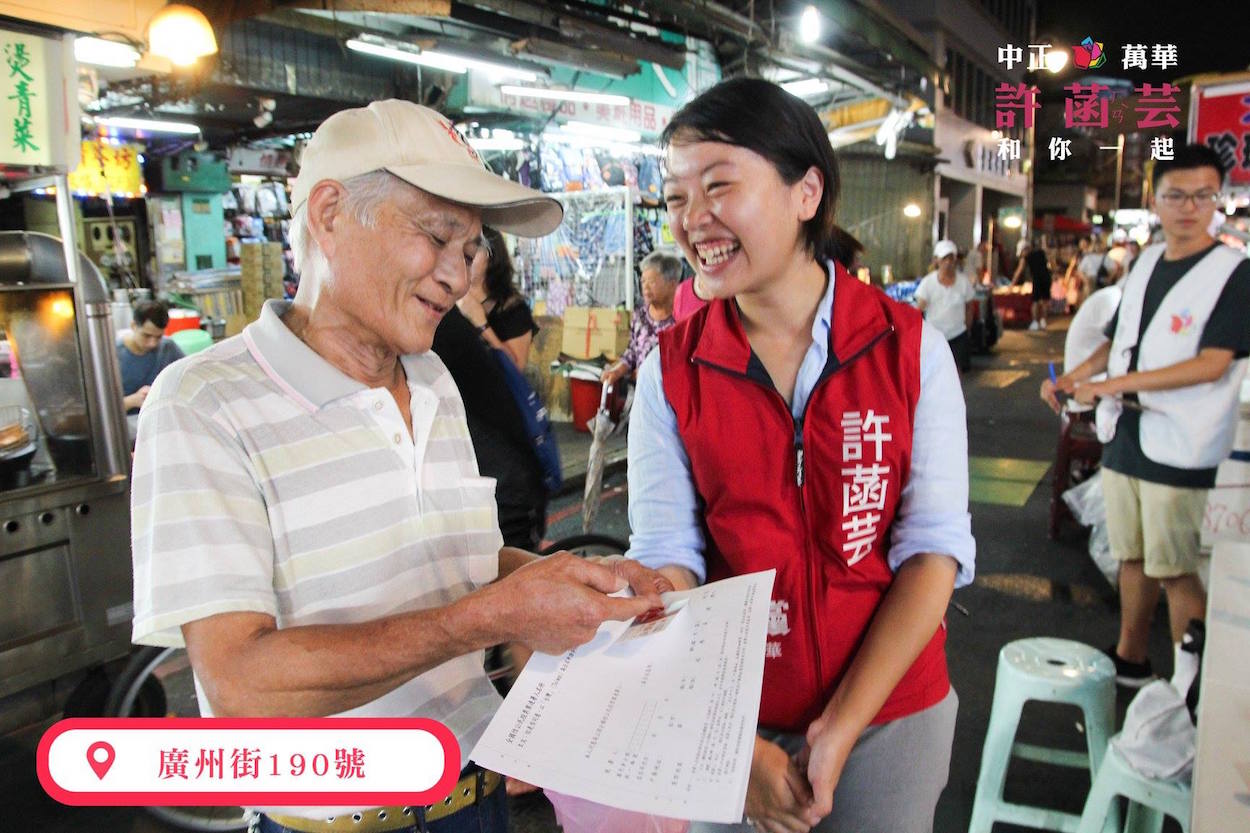 Photo credit: 許菡芸/Facebook
Photo credit: 許菡芸/Facebook
But I also feel that fighting for recognizability is also a struggle in terms of resources because young people have challenges paying for campaign ads, flyers, and online ads. Likewise, elections in Taipei tend to be heated on the national stage, because you are fighting to get onto political programs, to allow your abilities to be seen.
However, I feel that if everyone in an electoral district were to spend five minutes a day trying to get to know the candidates competing in their area—even if this only begins with receiving the official campaign flyers displaying all of candidates in an area—if you spend five minutes or just one percent of your day’s time to see what these candidates think, what their views are, and they’ve done in the past, this will not require candidates to spend so much on campaign ads or political ads. Participating in politics is not only running for office; this is also fundamental for politics.
BH: Do you think that the rise of the Third Force in Taiwan can be compared to phenomena in other countries, with the rise of other left-wing third parties?
HH: I think that the development of such a phenomenon suggests that conditions in many countries are not very good. For example in regards to a high rate of unemployment, as we see in Spain or other places. With high rates of unemployment and low salaries, some need to leave their original countries to work. This is the situation with Taiwan, with people leaving for China, Singapore, Japan, and other places. I feel that this is a shared issue and one which is transnational. It’s not entirely an in terms of the appearance of left-wing social democracy, but social inequality has led to the appearance of politicians who claim that they will uphold social equality.
I feel that in the context of Taiwan, the Third Force is the start of a generation of opposition, at a time in which problems with the democratic system have begun to emerge. But what is also key is that in the political system, there are forces that want to co-opt the milestones of progressive forces, such as with marriage equality, or Gongliao Reactor Number 4.
From the standpoints of most Taiwanese, after the lowering of the benchmarks needed to hold a referendum, conservative groups—such as religious groups—with regards to independence versus unification issues, energy, or motor transportation, etc., have perhaps begun to organize through the influence of the KMT. Through the democratic process, they hope to drag Taiwan back to twenty years ago, whether this may be through pushing for the development of nuclear power, advocating for economic development over the environment, the family structure over recognition of diverse sexualities, or the stability of cross-strait relations over Taiwanese sovereignty, etc. As these forces are currently developing, I feel that the 2018 elections may be a crucial battle.
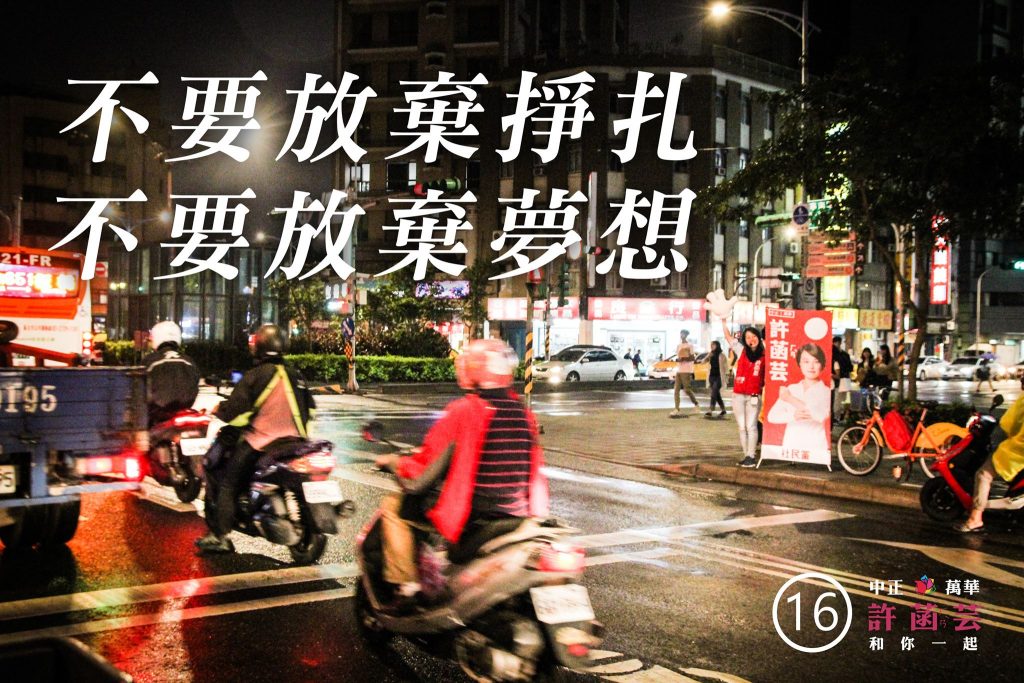 Photo credit: 許菡芸/Facebook
Photo credit: 許菡芸/Facebook
This is a crucial battle not only in terms of the number of seats the Third Force will win but also in terms of the potential to overcome the old forces which engage in vote buying, buying off influential people, etc—these sorts of old political forces. Right now, the Central Election Commission is evaluating the tenth referendum proposal from the “Nuclear Power for Green Environment” alliance. With the lowering of necessary benchmarks for the referendum, because local elections typically require sixty to seventy percent of the vote, if this can satisfy the requirements for a referendum, then the results of this battle of vote versus vote.
If the people can’t understand the respective meanings of the referendum proposals it very well may turn out that they will vote no to all of them. And this means that the progressive referendum proposals, such as the proposal on the 2020 Tokyo Olympics, or the one on marriage equality, may lose out—for instance, to the Protect the Family Alliance’s referendums against gay marriage or sexual equality education. But this would still be a lose-lose situation because after it became clear that these anti-gay referendum proposals would pass, this led opposition referendums to have an upsurge. As such, this referendum returns us to a battle of mobilization strength. However, this may not be beneficial for preserving the diversity of values in Taiwan, or the values upheld by the Social Democratic Party.
BH: So you think that current elections are different from 2018 elections regarding this point?
HH: Yes. The Taiwan Public Opinion Foundation released a poll released that 42% of young people in their 20s and 30s are willing to vote to support marriage equality. So can marriage equality, along with other progressive issues such as the 2020 Olympics game referendum, ride on the referendum wave to pass? This still remains to be seen.
BH: Lastly, what would you want to say to not only Taiwanese readers, but international readers?
HH: I would want to say that Taiwan is an island caught between China and America, hoping to find its own path and place in the world. I hope that on this island, that every move towards democracy can find links to international civil society. I hope that international civil society—regardless of whether these are young people concerned with political issues, or those who support small parties in Taiwan such as us, if they’re politicians or members of society, or people who support similar values such as with marriage equality and a clean environment—I hope that the people of this island are the ones who have sovereignty and that all of these demands can link and move forward together. I think this is a very important matter for this generation.
BH: Thank you.

